Accesibility
![]() The Secretariat for Inclusion offers a wide variety of support services to students with disabilities, including FM amplification equipment; support teachers/tutors; intern assistants; adapted exams (braille, magnified text, alternative formats, time extensions, etc.); accessible transport and financial assistance for transport and educational materials; adapted furniture and classroom/exam spaces; sign language interpreting; and adapted learning materials, among others.
The Secretariat for Inclusion offers a wide variety of support services to students with disabilities, including FM amplification equipment; support teachers/tutors; intern assistants; adapted exams (braille, magnified text, alternative formats, time extensions, etc.); accessible transport and financial assistance for transport and educational materials; adapted furniture and classroom/exam spaces; sign language interpreting; and adapted learning materials, among others.
Accommodation
 The Accommodation Office (Oficina de Gestión de Alojamientos) offers guidance to the university community on accommodation options in Granada, which include flats and apartments, private rooms, university residences, hostels and hotels, and a specific accommodation programme with elderly people. For tips on how to find accommodation, approximate costs and charges, contracts, and information on Granada's districts, visit the 'Accommodation and living in Granada' section of this website.
The Accommodation Office (Oficina de Gestión de Alojamientos) offers guidance to the university community on accommodation options in Granada, which include flats and apartments, private rooms, university residences, hostels and hotels, and a specific accommodation programme with elderly people. For tips on how to find accommodation, approximate costs and charges, contracts, and information on Granada's districts, visit the 'Accommodation and living in Granada' section of this website.
Canteens
 The UGR has 4 canteens and 12 cafes which are spread out across the city, serving quality food and refreshments at very reasonable prices. The lunchtime set menu (menú del día) includes a three course meal and drink for just €3.50 (€4 for takeaways). You can opt for the vegetarian, vegan, gluten-free and take-away set menus as long as you order them in advance through your “Virtual Office” student account. The weekly menu, featuring the ingredients and allergens for each dish, is available on the University Catering Services website. All you need to use the canteens is your University Smart Card (TUI). Find the nearest canteen or cafe using our Campus Map.
The UGR has 4 canteens and 12 cafes which are spread out across the city, serving quality food and refreshments at very reasonable prices. The lunchtime set menu (menú del día) includes a three course meal and drink for just €3.50 (€4 for takeaways). You can opt for the vegetarian, vegan, gluten-free and take-away set menus as long as you order them in advance through your “Virtual Office” student account. The weekly menu, featuring the ingredients and allergens for each dish, is available on the University Catering Services website. All you need to use the canteens is your University Smart Card (TUI). Find the nearest canteen or cafe using our Campus Map.
Opening hours: Monday to Friday from 1 p.m. to 3.30 p.m. The Fuentenueva University Canteen also opens on Saturdays from 1 p.m. to 3.30 p.m.
Campus map and transport
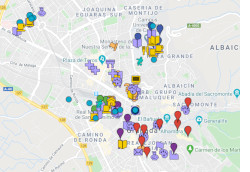
The following map indicates the location of the UGR's faculties, services, offices, libraries, canteens, and research institutes, as well as local police stations, hospitals, and tourist attractions.
The urban transport system in Granada is mainly provided by "Transportes Rober". You can consult their transport map, bus routes and timetables on their website. Three bus routes connect the main University campuses:
-
U1: Aynadamar Campus - Cartuja Campus
-
U2: Fuentenueva Campus - Cartuja Campus
-
U3: Health Sciences Technology Park (PTS) University Campus - Cartuja Campus
Granada also has a light rail system (“Metro de Granada”) that connects the city with the towns of Albolote, Maracena and Armilla. Public transport tickets will be substantially cheaper if you have a University Smart Card (TUI) or Credibús card.
Career support
 We offer career support, personalised guidance, professional development workshops and a range of online resources, ensuring you acquire the skills to achieve your career goals. Our Employment and Work Placement Office (CEP) provides the following services:
We offer career support, personalised guidance, professional development workshops and a range of online resources, ensuring you acquire the skills to achieve your career goals. Our Employment and Work Placement Office (CEP) provides the following services:
-
Career advice in one-to-one sessions
-
Internships at companies, organisations, and public bodies (including the UGR)
-
International internships (via Erasmus+ traineeships and the UGR Transnational Internship Fund)
-
A job offer database
-
Professional development workshops and resources
-
Career fairs and open days
-
The UGR Employment Forum
-
Mock interview sessions (available online)
Via the UGR Empleo 2.0 website you can subscribe to receive emails notifying you of job offers, mobility opportunities, and internships, tailored to meet your specific needs and areas of interest. For further information, please visit the 'Career support' section.
Cloud storage
 The “Consigna” Temporary Cloud Storage Service is particularly useful for sending files that are too large to be sent by email. To save or upload files in “Consigna”, use the username and password for your university email account. For further information visit the CSIRC website.
The “Consigna” Temporary Cloud Storage Service is particularly useful for sending files that are too large to be sent by email. To save or upload files in “Consigna”, use the username and password for your university email account. For further information visit the CSIRC website.
Cultural events
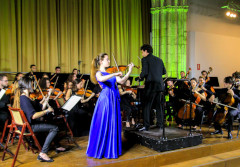 You can view the upcoming cultural events at the UGR, including concerts, film screenings, theatre productions, exhibitions and conferences by using our Cultural Events Calendar. These events, which are free of charge, are open to all members of the UGR community and the general public.
You can view the upcoming cultural events at the UGR, including concerts, film screenings, theatre productions, exhibitions and conferences by using our Cultural Events Calendar. These events, which are free of charge, are open to all members of the UGR community and the general public.
Email account
 The UGR offers its students and staff a university email account which belongs to the domain @correo.ugr.es. To activate your email account, log in to your “Virtual Office” student account and click “Correo Electrónico” (email address). You will need a UGR email address to access the Platform for Teaching Support Resources (PRADO), which our lecturers use to upload course materials and notifications.
The UGR offers its students and staff a university email account which belongs to the domain @correo.ugr.es. To activate your email account, log in to your “Virtual Office” student account and click “Correo Electrónico” (email address). You will need a UGR email address to access the Platform for Teaching Support Resources (PRADO), which our lecturers use to upload course materials and notifications.
Entrepreneurship
 UGRemprendedora runs programmes and courses in areas such as design thinking, market analysis, social entrepreneurship, career support, start-up management and the acquisition of entrepreneurial skills. It also runs competitions and provides funding opportunities for start-ups and individuals with innovative projects, enabling you to turn your ideas into a reality. By becoming part of the entrepreneurship community at the University of Granada you will have excellent opportunities to network, receive support, and set up projects either individually or in teams of like-minded people.
UGRemprendedora runs programmes and courses in areas such as design thinking, market analysis, social entrepreneurship, career support, start-up management and the acquisition of entrepreneurial skills. It also runs competitions and provides funding opportunities for start-ups and individuals with innovative projects, enabling you to turn your ideas into a reality. By becoming part of the entrepreneurship community at the University of Granada you will have excellent opportunities to network, receive support, and set up projects either individually or in teams of like-minded people.
General Information Office
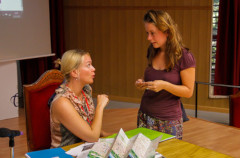 The General Information Office handles general enquiries and information requests at the UGR. Specifically, it deals with enquiries related to the following areas: university admissions and enrolments, entry requirements, application procedures, course fees, grants and scholarships, academic calendars, academic regulations, and the issuing of degrees and diplomas.
The General Information Office handles general enquiries and information requests at the UGR. Specifically, it deals with enquiries related to the following areas: university admissions and enrolments, entry requirements, application procedures, course fees, grants and scholarships, academic calendars, academic regulations, and the issuing of degrees and diplomas.
Grants
 In addition to facilitating access to grants and scholarships supported by national and international bodies, the UGR runs its own grants programme that provides students with a range of funding opportunities. To find out more, visit the Grants Service website.
In addition to facilitating access to grants and scholarships supported by national and international bodies, the UGR runs its own grants programme that provides students with a range of funding opportunities. To find out more, visit the Grants Service website.
Guidance and counselling
 The Educational Psychology Office (GPP) provides the following services:
The Educational Psychology Office (GPP) provides the following services:
Personal counselling and advice: support for those experiencing personal difficulties affecting their academic performance, mood, or relationships with others.
Academic guidance: support for those finding it difficult to keep up with their studies due to time constraints, time management problems, or issues with study techniques.
Professional guidance: support for those finding it difficult to decide on a specific career path.
The GPP also offers training in study techniques and public speaking. To make use of the GPP’s services, you must visit the office in person and book an appointment.
Health Guidance Office (CEJOS)
 The Health Guidance Office (CEJOS) is run by the Vice-Rectorate for Student Services and Employability together with the Spanish League for Education and Popular Culture (LEECP). It aims to 1) Provide information on sexuality and sexual health in an anonymous, confidential and objective way, incorporating a gender perspective; 2) Raise awareness among the university community on gender equality, combating sexist behaviour; and 3) Prevent gender-based violence through the identification of warning signs in relationships.
The Health Guidance Office (CEJOS) is run by the Vice-Rectorate for Student Services and Employability together with the Spanish League for Education and Popular Culture (LEECP). It aims to 1) Provide information on sexuality and sexual health in an anonymous, confidential and objective way, incorporating a gender perspective; 2) Raise awareness among the university community on gender equality, combating sexist behaviour; and 3) Prevent gender-based violence through the identification of warning signs in relationships.
This service offers face-to-face support for individuals, couples and groups; a helpline; assistance via email and social media; pregnancy tests; HIV testing; free condoms and lubricants; and educational activities (workshops on sexuality from a gender perspective, on health education, training for those working in HIV prevention, etc.).
Induction days
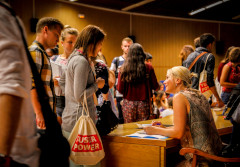 The University of Granada runs Induction Days in September and January/February every year to give our new international students a warm welcome, help them to get their bearings and to adjust to university life in Granada. During the sessions, we provide useful information on everything from registering, obtaining the international student card, health cover and residence permits, to joining student societies, volunteering and making the most of the exceptional range of services available at the UGR.
The University of Granada runs Induction Days in September and January/February every year to give our new international students a warm welcome, help them to get their bearings and to adjust to university life in Granada. During the sessions, we provide useful information on everything from registering, obtaining the international student card, health cover and residence permits, to joining student societies, volunteering and making the most of the exceptional range of services available at the UGR.
Language support
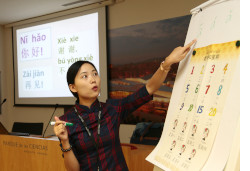 As a UGR student you can learn Spanish and other languages — including English, French, German, Italian, Japanese, Portuguese, Swedish, Romanian, Arabic, Russian, Chinese, Persian, Polish, and Czech — alongside 8,000 local and international peers who enrol every year on courses offered by the UGR’s Modern Languages Centre (CLM), Confucius Institute (ICUGR), and Centre for Slavic Cultures. Additionally, we provide our undergraduate students with free, official language-accreditation exams at B1 level or higher.
As a UGR student you can learn Spanish and other languages — including English, French, German, Italian, Japanese, Portuguese, Swedish, Romanian, Arabic, Russian, Chinese, Persian, Polish, and Czech — alongside 8,000 local and international peers who enrol every year on courses offered by the UGR’s Modern Languages Centre (CLM), Confucius Institute (ICUGR), and Centre for Slavic Cultures. Additionally, we provide our undergraduate students with free, official language-accreditation exams at B1 level or higher.
Libraries
.jpg) With 23 individual libraries throughout the city, we ensure that a comfortable study environment is always close to you. Our library services are extensive, encompassing training courses and workshops, a reading club ("Club de Lectura Leyend@”), loans of laptops and e-readers, bookcrossings, competitions, access to prestigious international journals and databases, exhibitions, documentation tools, and personalised services for people with disabilities. If you wish to borrow any of the library resources and use your online library account, you must have a University Smart Card (TUI).
With 23 individual libraries throughout the city, we ensure that a comfortable study environment is always close to you. Our library services are extensive, encompassing training courses and workshops, a reading club ("Club de Lectura Leyend@”), loans of laptops and e-readers, bookcrossings, competitions, access to prestigious international journals and databases, exhibitions, documentation tools, and personalised services for people with disabilities. If you wish to borrow any of the library resources and use your online library account, you must have a University Smart Card (TUI).
Other services include:
-
Late-night study rooms during exam periods (Dec-Feb, May-Jul).
-
Electronic library: resources from the most prestigious journals, databases, books, dictionaries and encyclopedias in the world. You can also access these resources using a VPN connection.
-
Copy centres: each library has its own printing, photocopying and scanning services, except for the “Hospital Real” Library.
-
Bibliomaker space: located at the Faculty of Science, this space provides the university community with the opportunity to develop ideas, innovate, and work collaboratively within the worldwide 'maker culture' movement.
-
A Research Support Portal that offers information on library resource training and provides you with the tools to develop your dissertation and create sound bibliographies.
UGR libraries normally open from 9 a.m. to 9 p.m. Monday to Friday. Opening hours may vary depending on the faculty or school and may be reduced during holiday periods.
Mentor Programme
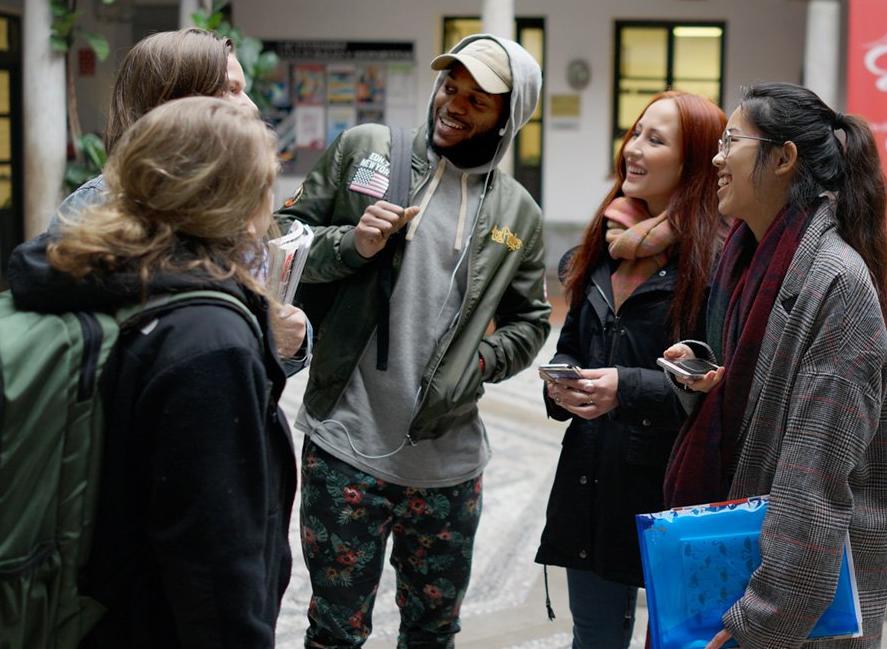 Moving to a new study destination can sometimes be a daunting prospect. The UGR Mentor Programme is a student-oriented initiative designed to help our international community with their cultural, academic and social integration, making the transition as stress-free as possible and enabling them to form close bonds with our home students. As well helping you with a number of initial administrative procedures, your assigned mentor or ‘buddy’ will also help you to get your bearings in the city and learn Spanish more effectively.
Moving to a new study destination can sometimes be a daunting prospect. The UGR Mentor Programme is a student-oriented initiative designed to help our international community with their cultural, academic and social integration, making the transition as stress-free as possible and enabling them to form close bonds with our home students. As well helping you with a number of initial administrative procedures, your assigned mentor or ‘buddy’ will also help you to get your bearings in the city and learn Spanish more effectively.
MOOCs
 The University of Granada, through its Resource Production Centre for the Digital University (CEPRUD), provides Massive Open Online Courses (MOOCs) to students and the public alike. You can join the courses for free and complete them with the support of online instructors. If you complete 75% of the course contents and activities you can also earn a certificate of participation.
The University of Granada, through its Resource Production Centre for the Digital University (CEPRUD), provides Massive Open Online Courses (MOOCs) to students and the public alike. You can join the courses for free and complete them with the support of online instructors. If you complete 75% of the course contents and activities you can also earn a certificate of participation.
MOOCs currently offered by the UGR in English and Spanish:
-
The Alhambra: History, Art and Heritage
-
Federico García Lorca
-
Sierra Nevada
Recreational courses
 The “Casa de Porras” University Cultural Centre (Casa del Estudiante) runs over 50 recreational and vocational courses in the following areas: the Performing Arts, Music and Literature; Visual Arts, Design and Crafts; Science, New Technologies and Entrepreneurship; Health, Food and Sports; Environment; Heritage and the City; and Inclusion and Diversity. These courses are open to the university community and the general public. The Centre also offers you the opportunity to display your artwork free of charge, set up courses and workshops, and hold seminars and exhibitions.
The “Casa de Porras” University Cultural Centre (Casa del Estudiante) runs over 50 recreational and vocational courses in the following areas: the Performing Arts, Music and Literature; Visual Arts, Design and Crafts; Science, New Technologies and Entrepreneurship; Health, Food and Sports; Environment; Heritage and the City; and Inclusion and Diversity. These courses are open to the university community and the general public. The Centre also offers you the opportunity to display your artwork free of charge, set up courses and workshops, and hold seminars and exhibitions.
Societies
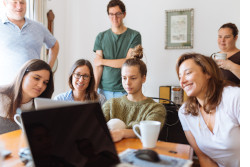 If you are interested in getting involved in university life and in meeting people with similar interests, we encourage you to join one of our student societies (asociaciones de estudiantes). You can view a list of all our student societies on the Vice-Rectorate for Student Services and Employability website.
If you are interested in getting involved in university life and in meeting people with similar interests, we encourage you to join one of our student societies (asociaciones de estudiantes). You can view a list of all our student societies on the Vice-Rectorate for Student Services and Employability website.
Sports
 The UGR’s Sports Centre (CAD) offers sports and activities in seven main categories: racket sports, body and mind, fitness, dance, swimming and water sports, mountain sports, a programme for over 50s, and activities such as fencing, archery, horse riding and taekwondo. It also runs an extensive range of competitions and tournaments throughout the year. Once you have officially enrolled at the UGR and obtained your access credentials for your “Oficina Virtual” student account, you can apply to take part in CAD courses by clicking “Cursos y alta deportiva”. Alternatively, you can sign up in person.
The UGR’s Sports Centre (CAD) offers sports and activities in seven main categories: racket sports, body and mind, fitness, dance, swimming and water sports, mountain sports, a programme for over 50s, and activities such as fencing, archery, horse riding and taekwondo. It also runs an extensive range of competitions and tournaments throughout the year. Once you have officially enrolled at the UGR and obtained your access credentials for your “Oficina Virtual” student account, you can apply to take part in CAD courses by clicking “Cursos y alta deportiva”. Alternatively, you can sign up in person.
Staff directory
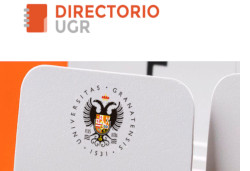 You can search for specific staff members at our University using the UGR Directory. The directory indicates the faculty and department where teaching staff members work, their telephone number, email address, work address, and office hours for tutorials.
You can search for specific staff members at our University using the UGR Directory. The directory indicates the faculty and department where teaching staff members work, their telephone number, email address, work address, and office hours for tutorials.
Student account
 The “Virtual Office” student account is a virtual platform in which you can: 1) activate your university email account and change your password; 2) consult your academic transcript and view your current enrolments; 3) pre-order takeaway meals from the University Catering Service; 4) sign up to courses at the Sports Centre; and 5) apply for the University Smart Card (TUI). You can access your “Virtual Office” student account using the same passport, Foreigner’s Identification Number (NIE) or ID number you used to enrol at the UGR and the password (PIN) that you were given by your faculty or school at the UGR.
The “Virtual Office” student account is a virtual platform in which you can: 1) activate your university email account and change your password; 2) consult your academic transcript and view your current enrolments; 3) pre-order takeaway meals from the University Catering Service; 4) sign up to courses at the Sports Centre; and 5) apply for the University Smart Card (TUI). You can access your “Virtual Office” student account using the same passport, Foreigner’s Identification Number (NIE) or ID number you used to enrol at the UGR and the password (PIN) that you were given by your faculty or school at the UGR.
Student Information Centre (CIEVE)
 If you have a general or specific query about any of our student services, you can call into our Student Information Centre (CIEVE) or, alternatively, call our Student Information Helpline free of charge from any national operator. Whether you need information on grants, enrolling, national mobility opportunities, accommodation, student societies, student cards, bus passes, cultural activities, or other UGR services — we can help you. Free helpline: 900 900 134 (9 a.m. to 2 p.m. and 4 p.m. to 9 p.m., Mon-Fri).
If you have a general or specific query about any of our student services, you can call into our Student Information Centre (CIEVE) or, alternatively, call our Student Information Helpline free of charge from any national operator. Whether you need information on grants, enrolling, national mobility opportunities, accommodation, student societies, student cards, bus passes, cultural activities, or other UGR services — we can help you. Free helpline: 900 900 134 (9 a.m. to 2 p.m. and 4 p.m. to 9 p.m., Mon-Fri).
Student Support Service (SAE)
.jpg) The Student Support Service (SAE) is committed to helping you resolve academic and administrative issues that can arise during your studies. Among other actions, it works to improve accessibility for students with disabilities; provide information on accommodation options; inform students about their rights; provide personalised guidance on financial support, grants, and resources; and give legal advice (on academic matters, calls, rental contracts, etc.).
The Student Support Service (SAE) is committed to helping you resolve academic and administrative issues that can arise during your studies. Among other actions, it works to improve accessibility for students with disabilities; provide information on accommodation options; inform students about their rights; provide personalised guidance on financial support, grants, and resources; and give legal advice (on academic matters, calls, rental contracts, etc.).
UGR MediaLab
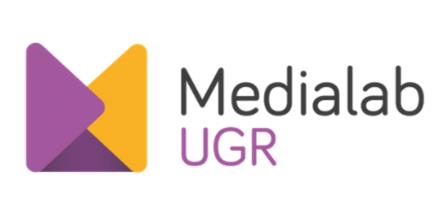 UGR MediaLab strives to serve as an open laboratory for the generation of proposals at the University and in society, as a research hub, and as an experimental space for exploring creativity and new ways of generating knowledge in digital societies. The Lab places special emphasis on prototyping and open knowledge. It focuses on the strategic areas of digital society, digital humanities and digital science. If you are developing research activities and wish to share your results, you can discuss them on UGR RadioLab programmes and podcasts. Anyone can send a proposal to make a radio programme with UGR RadioLab, provided the topic is related to the digital sphere (i.e. to the strategic lines endorsed by UGR MediaLab).
UGR MediaLab strives to serve as an open laboratory for the generation of proposals at the University and in society, as a research hub, and as an experimental space for exploring creativity and new ways of generating knowledge in digital societies. The Lab places special emphasis on prototyping and open knowledge. It focuses on the strategic areas of digital society, digital humanities and digital science. If you are developing research activities and wish to share your results, you can discuss them on UGR RadioLab programmes and podcasts. Anyone can send a proposal to make a radio programme with UGR RadioLab, provided the topic is related to the digital sphere (i.e. to the strategic lines endorsed by UGR MediaLab).
University Film Club
 The University Film Club (Cine Club Universitario) gives you the opportunity to explore the history of film, understand the evolution of cinematic language, and enhance your knowledge of film-making and cinematography. The Club runs a unique series of thematic film screenings every month and delivers cinematography courses. These activities are open to both members of the university community and the public.
The University Film Club (Cine Club Universitario) gives you the opportunity to explore the history of film, understand the evolution of cinematic language, and enhance your knowledge of film-making and cinematography. The Club runs a unique series of thematic film screenings every month and delivers cinematography courses. These activities are open to both members of the university community and the public.
University Smart Card (TUI)
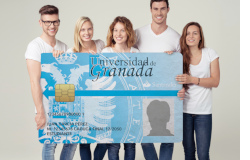 The University Smart Card (TUI) will give you access to university buildings, libraries, study rooms, and canteens, as well as to electronic identification and digital signature systems. It also provides access to student discounts, including on bus passes and in local shops. All you need to do to obtain your TUI card is present your ID (Passport, NIE, TIE, or DNI document) at one of the following two offices: Faculty of Science (Fuentenueva Campus) - Banco Santander office or the Faculty of Economics and Business (Cartuja Campus) - Banco Santander office. The TUI card is also issued at an additional four faculties during the month of September. To view these faculties and consult the corresponding opening hours please visit the TUI website. Alternatively, you can apply for the TUI card through your “Virtual Office” student account, although it will take at least 30 days for it to be posted.
The University Smart Card (TUI) will give you access to university buildings, libraries, study rooms, and canteens, as well as to electronic identification and digital signature systems. It also provides access to student discounts, including on bus passes and in local shops. All you need to do to obtain your TUI card is present your ID (Passport, NIE, TIE, or DNI document) at one of the following two offices: Faculty of Science (Fuentenueva Campus) - Banco Santander office or the Faculty of Economics and Business (Cartuja Campus) - Banco Santander office. The TUI card is also issued at an additional four faculties during the month of September. To view these faculties and consult the corresponding opening hours please visit the TUI website. Alternatively, you can apply for the TUI card through your “Virtual Office” student account, although it will take at least 30 days for it to be posted.
Volunteering
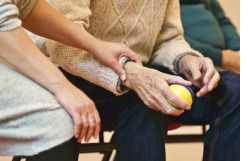 UGR-Solidaria strives to boost local development by providing members of the university community with volunteering opportunities working with disadvantaged and vulnerable groups in society. It collaborates closely with non-profit organisations and NGOs (including Amnesty International, the Red Cross and Oxfam Intermón) that work in areas such as humanitarian aid, disability awareness and support, environmental awareness, discrimination and racism, addiction, social exclusion, gender inequality, and access to education and culture.
UGR-Solidaria strives to boost local development by providing members of the university community with volunteering opportunities working with disadvantaged and vulnerable groups in society. It collaborates closely with non-profit organisations and NGOs (including Amnesty International, the Red Cross and Oxfam Intermón) that work in areas such as humanitarian aid, disability awareness and support, environmental awareness, discrimination and racism, addiction, social exclusion, gender inequality, and access to education and culture.
The UGR’s Centre for Development Cooperation Initiatives (CICODE), meanwhile, provides opportunities to volunteer overseas as part of international development cooperation projects.
Wi-Fi
 Eduroam (education roaming) is the secure, world-wide roaming service developed for the international research and education community. It is now employed by thousands of institutions in over 100 countries and enables students, researchers and staff from participating universities to obtain high-speed and secure internet connectivity while on campus and when visiting other educational institutions. Eduroam employs the most secure encryption and authentication standards currently in existence, so it is much more secure than typical commercial hotspots.
Eduroam (education roaming) is the secure, world-wide roaming service developed for the international research and education community. It is now employed by thousands of institutions in over 100 countries and enables students, researchers and staff from participating universities to obtain high-speed and secure internet connectivity while on campus and when visiting other educational institutions. Eduroam employs the most secure encryption and authentication standards currently in existence, so it is much more secure than typical commercial hotspots.